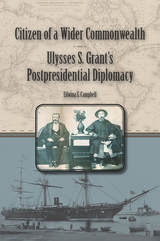
Traveling commercially and on U.S. Navy warships, Grant visited ports of call throughout the British Empire, Europe, and Asia, including Britain, France, Egypt, the Ottoman Empire, Greece, Italy, the Netherlands, Germany, Scandinavia, Russia, Spain, Portugal, Gibraltar, Ireland, India, Singapore, Hong Kong, China, and Japan. Along the way, he met with monarchs, ministers, and average citizens, creating the model for the summitry and public diplomacy practiced by future American presidents and articulating concepts of national self-determination, international organization, and the peaceful settlement of international disputes decades before Elihu Root’s advocacy of binding international arbitration and Woodrow Wilson’s proposal for the League of Nations.
Campbell reveals Grant to be a skillful envoy who brought to his travels the deep interest in foreign policy issues he had shown during his administration. Grant confirmed the United States’ commitment to Anglo-American cooperation, demonstrated America’s interest in the territorial integrity of China, affirmed American faith in universal (male) suffrage as the basis for governmental legitimacy, and asserted the importance of an international order based on equality and justice for all states and their citizens. Grant’s efforts shaped not only John Hay’s Open Door policy in 1899–1900 but also the broader American approach to twentieth-century international relations. Throughout the trip, Julia Grant proved essential to the success of her husband’s mission, and Campbell tells how the couple impressed people around the world with an enduring image of an American president and first lady.
By illuminating the significance of Grant’s often overlooked postpresidential travels, Citizen of a Wider Commonwealth establishes the eighteenth president as a key diplomat whose work strongly influenced the direction of future U.S. foreign policy and contributes substantially to the study of American international relations.

When the American reporter Henry Morton Stanley stepped out of the jungle in 1871 and doffed his pith helmet to the Scottish missionary-explorer Dr. David Livingstone, his greeting was to take on mythological proportions. But do any of us really know what his words meant at the time--and what they have come to mean since?
Far from meeting in a remote thicket in "Darkest Africa," Stanley met Livingstone in the middle of a thriving Muslim community. The news of their encounter was transmitted around the globe, and Livingstone instantly became one of the world's first international celebrities.
This book shows how urgently a handshake between a Briton and an American was needed to heal the rift between the two countries after the American Civil War. It uncovers for the first time the journeys that Livingstone's African servants made around Britain after his death, and it makes a case for Stanley's immense influence on the idea of the modern at the dawn of the twentieth century. Drawing on films, children's books, games, songs, cartoons, and TV shows, this book reveals the many ways our culture has remembered Stanley's phrase, while tracking the birth of an Anglo-American Christian imperialism that still sets the world agenda today.
Dr. Livingstone, I Presume? is a story of conflict and paradox that also takes us into the extraordinary history of British engagement with Africa. Clare Pettitt shows both the bleakest side of imperialism and the strange afterlife of a historical event in popular mythmaking and music hall jokes.
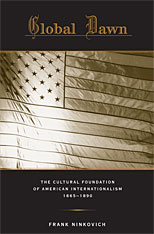
Why did the United States become a global power? Frank Ninkovich shows that a cultural predisposition for thinking in global terms blossomed in the late nineteenth century, making possible the rise to world power as American liberals of the time took a wide-ranging interest in the world. At the center of their attention was the historical process they called “civilization,” whose most prominent features—a global economy, political democracy, and a global culture—anticipated what would later come to be known as globalization.
The continued spread of civilization, they believed, provided the answer to worrisome contemporary problems such as the faltering progress of democracy, a burgeoning arms race in Europe, and a dangerous imperialist competition. In addition to transforming international politics, a global civilization quickened by commercial and cultural exchanges would advance human equality and introduce the modern industrial way of life to traditional societies. Consistent with their universalist outlook, liberal internationalists also took issue with scientific racism by refusing to acknowledge racial hierarchy as a permanent feature of relations with nonwhite peoples.
Of little practical significance during a period when isolationism reigned supreme in U.S. foreign policy, this rich body of thought would become the cultural foundation of twentieth-century American internationalism.
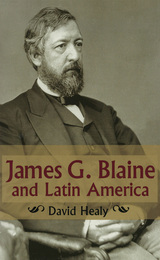
James G. Blaine was one of the leading national political figures of his day, and probably the most controversial. Intensely partisan, the dominant leader of the Republican Party, and a major shaper of national politics for more than a decade, Blaine is remembered chiefly for his role as architect of the post-Civil War GOP and his two periods as secretary of state. He also was the Republican presidential candidate in the notorious mud-slinging campaign of 1884. His foreign policy was marked by its activism, its focus on Latin America, and its attempt to increase U.S. influence there.
James G. Blaine and Latin America asserts that Latin America lay at the heart of Blaine's foreign policy and his vision for America. David Healy examines seven major issues that collectively defined the secretary of state's methods, goals, and views regarding Latin America and, more broadly, the international role of the United States. Healy places his explorations within the larger context of Blaine's ongoing role as a national party leader, his relations with the presidents under whom he served, and the responses of his predecessors and successors toward the issues at hand in Latin America.
The result is a deeper understanding of Blaine's ambitious vision for his country's international role, his energy and aggressiveness in moving to achieve that vision, and his effective efforts to transmit his worldview to the public. Blaine's emphasis on the importance of Latin America to the United States and his conviction that his country should be a world power influenced a new generation of leaders who, at the end of the century, would go beyond his goals and usher in a new era.
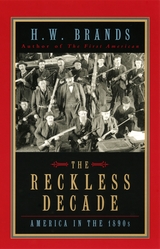
The 1890s saw the closing of the American frontier and a shift toward imperialist ambitions. Populists and muckrakers grappled with robber barons and gold-bugs. Americans addressed the unfinished business of Reconstruction by separating blacks and whites. Booker T. Washington, W. E. B. Du Bois, and other black leaders clashed over the proper response to continuing racial inequality. Those on top of the economic heap—Rockefeller, Carnegie, and Morgan—created vast empires of wealth, while those at the bottom worked for dimes a day. Brands brings all this to life in a vivid narrative filled with larger-than-life characters facing momentous challenges as they worked toward an uncertain future.
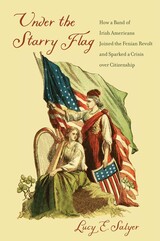
Winner of the Myrna F. Bernath Book Award
“A stunning accomplishment…As the Trump administration works to expatriate naturalized U.S. citizens, understanding the history of individual rights and state power at the heart of Under the Starry Flag could not be more important.”
—Passport
“A brilliant piece of historical writing as well as a real page-turner. Salyer seamlessly integrates analysis of big, complicated historical questions—allegiance, naturalization, citizenship, politics, diplomacy, race, and gender—into a gripping narrative.”
—Kevin Kenny, author of The American Irish
In 1867 forty Irish American freedom fighters, outfitted with guns and ammunition, sailed to Ireland to join the effort to end British rule. They were arrested for treason as soon as they landed. The Fenians, as they were called, claimed to be American citizens, but British authorities insisted that they remained British subjects. Following the Civil War, the Fenian crisis dramatized the question of whether citizenship should be considered an inalienable right.
This gripping legal saga, a prelude to today’s immigration battles, raises important questions about immigration, citizenship, and who deserves to be protected by the law.
READERS
Browse our collection.
PUBLISHERS
See BiblioVault's publisher services.
STUDENT SERVICES
Files for college accessibility offices.
UChicago Accessibility Resources
home | accessibility | search | about | contact us
BiblioVault ® 2001 - 2024
The University of Chicago Press









